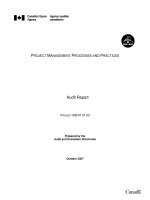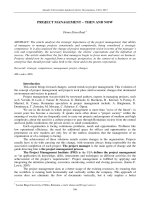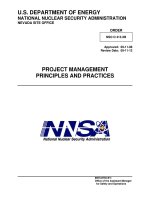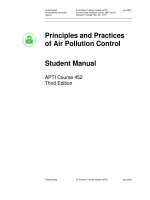Project management principles and practices
Bạn đang xem bản rút gọn của tài liệu. Xem và tải ngay bản đầy đủ của tài liệu tại đây (245.52 KB, 100 trang )
Project Management
Principles and Practices
Level 1
Agenda
Introductions
Course Objective
Unit 1: Introduction to Project Management
Unit 2: Project Definition
Unit 3: Project Planning
Introductions
What is your Project Management
Experience?
What types of projects will you be
involved in?
What would you like to get out of the
course?
Course Objectives
Learn what project management is and the qualities of an effective
project manager.
Understand the nine knowledge areas of project management and how
they can be applied to your project.
Discover the phases of a project and what deliverables are expected
when.
Identify a project’s key stakeholders.
Understand the different types of business cases and how to create a
Statement of Work.
Learn to be prepared for the unexpected by utilizing risk management
and change control.
Learn how to organize project activities by creating a Work Breakdown
Structure.
Create a network diagram to track your project’s progress.
Learn budgeting and estimating techniques.
Reference Material
Project Management
The Complete Idiot’s Guide
Unit 1
Introduction to Project
Management
Introduction to Project
Management
Project Failures
Project Successes
What is Project Management?
Key Functional Areas of Project
Management
Project Life Cycle
Project Failure
Identify reasons that project fail
Reasons for Project Failure
Chapter 3 Page 22
1.
Poor project and program management discipline
2.
Lack of executive-level support
3.
No linkage to the business strategy
4.
Wrong team members
5.
No measures for evaluating the success of the
project
6.
No risk management
7.
Inability to manage change
Project Success Criteria
Chapter 1 Page 6
On time
On budget
Meeting the goals that have been
agreed upon
Iron Triangle
Pick Any Two
What is a Project?
Temporary with specific start and end
dates
Unique
Progress elaboration
What is a Project Manager?
Chapter 2
Ultimately responsible for the Project’s
Success
Plan and Act
Focus on the project’s end
Be a manager & leader
Seven Traits of Good Project
Managers
Trait 1
Enthusiasm for the project
Trait 2
Ability to manage change effectively
Trait 3
A tolerant attitude toward ambiguity
Trait 4
Team – building and negotiating skills
Seven Traits of Good Project
Managers
Trait 5
A customer-first orientation
Trait 6
Adherence to the priorities of business
Trait 7
Knowledge of the industry or technology
Project Success
12 Golden Rules
(Chapter 3)
Rule #1
Thou shalt gain consensus on project
outcome.
Project Success
12 Golden Rules
Rule #2
Thou shalt build the best team
possible.
Project Success
12 Golden Rules
Rule #3
Thou shalt develop a comprehensive,
viable plan and keep it up-to-date.
Project Success
12 Golden Rules
Rule #4
Thou shalt determine how much stuff
you really need to get things done.
Project Success
12 Golden Rules
Rule #5
Thou shalt have a realistic schedule.
Project Success
12 Golden Rules
Rule #6
Thou won’t try to do more than can be
done.
Project Success
12 Golden Rules
Rule #7
Thou will remember that people count.
Project Success
12 Golden Rules
Rule #8
Thou will gain the formal and ongoing
support of management and
stakeholders.
Project Success
12 Golden Rules
Rule 9
Thou must be willing to change.









